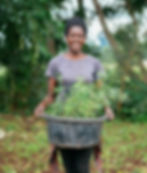
BIODIVERSE.
INDIGENOUS.
SUSTAINABLE.

500 ACRE FOREST RESTORATION PILOT
While farming fast-growing trees for charcoal is essential to sustainably meet Uganda’s cooking fuel demands, it is equally crucial to restore the natural forests that have already been lost. These native forests provide irreplaceable ecological services—stabilizing local climates, protecting water catchments, supporting biodiversity, and maintaining healthy soils. Indigenous forests are vital habitats for countless species that cannot thrive in managed charcoal plantations, and restoring them is key to preserving Uganda's biodiversity and ensuring long-term environmental resilience. To balance human needs with ecological health, we started a restoration pilot project in 2021 alongside our nursery hub model. This approach maximizes benefits for the community, carbon sequestration, and the environment, and is ready to scale to tens of thousands of hectares.

FARMING TREES TO MEET UGANDA'S NEED FOR COOKING FUEL
Uganda's forests won't truly recover until we tackle the root cause: the overwhelming demand for cooking fuel. Right now, millions of households rely on charcoal and firewood, putting relentless pressure on forests. Any attempt at reforestation is quickly undone because people need cooking fuel for daily survival. Sustainable alternatives to charcoal and firewood have been tried time and again, but none have successfully met the needs of Ugandan households. The key to real, lasting forest restoration lies in farming fast-growing trees specifically for charcoal—providing a sustainable, renewable supply that meets household needs while protecting natural forests. By shifting to this approach, we can reduce pressure on native forests and finally create a pathway for meaningful restoration.

PARTNERING WITH THE LOCAL COMMUNITY
We partner closely with local communities to manage our restoration sites, ensuring both ecological and economic benefits. Together, we plant and care for these forests, creating local jobs and fostering a sense of shared responsibility. We also designate portions of the land for fruit trees, directly benefiting the community by providing food and additional income opportunities. Our nursery hubs are established near these restoration sites, supporting ongoing reforestation efforts and providing a central hub for resources and training. With the community profiting from the nearby charcoal farming, they are incentivized to keep the restoration sites thriving, ensuring the long-term success of both the environmental and economic initiatives.

RESTORING INDIGENOUS TROPICAL FORESTS OF UGANDA'S PAST
Biodiverse, indigenous forests that mimic the local ecosystem offer far greater benefits compared to monoculture tree plantations. Unlike monocultures, which lack resilience and often struggle with pests, disease, and poor soil health, diverse forests create balanced ecosystems that support a wide range of plant and animal species, improving biodiversity. Indigenous tree species are naturally adapted to local climate conditions, making them more resilient to environmental stressors, which ensures long-term forest health and stability. From a carbon perspective, biodiverse forests are more effective at sequestering and storing carbon over time because they maintain a stable ecosystem that supports richer, deeper soil carbon stocks and a variety of growth cycles. This means that carbon sequestration is more reliable and sustainable, contributing to both climate mitigation and ecological restoration in a way that monocultures simply cannot match.

THE NEW STANDARD FOR CARBON CREDITS
At Kijani, we are setting a new standard for carbon projects by emphasizing transparency, community engagement, and data-driven integrity. Our robust data management and advanced tree tracking systems allow us to monitor every aspect of our projects, providing clear and verifiable carbon outcomes. Unlike many traditional models, we ensure that the local community is properly incentivized—not just to maintain the forests but to genuinely thrive economically through their work with us. This holistic approach results in higher-quality carbon credits, as our projects are not only sequestering carbon but also creating sustainable, community-driven ecosystems. By aligning environmental goals with community success, we create a carbon model that is resilient, transparent, and focused on lasting impact. Each credit reflects a commitment to reversing deforestation, stabilizing local climates, and creating lasting economic opportunities for rural communities.

10,000 HECTARES OF NEW FORESTS
BY 2030
We are ready to scale this Restoration Model to create profound and lasting impact across Uganda. This ambitious growth will not only significantly increase carbon sequestration, contributing to climate change mitigation, but also restore crucial biodiversity and stabilize local ecosystems. Expanding to this scale will provide thousands of jobs, offering stable incomes to rural communities while enhancing food security through fruit tree planting. The increased forest cover will protect water resources, improve soil health, and create resilient landscapes capable of supporting both people and wildlife. Through this large-scale effort, Kijani is poised to drive meaningful change—lifting communities out of poverty while protecting Uganda's natural heritage and contributing to global climate goals.
